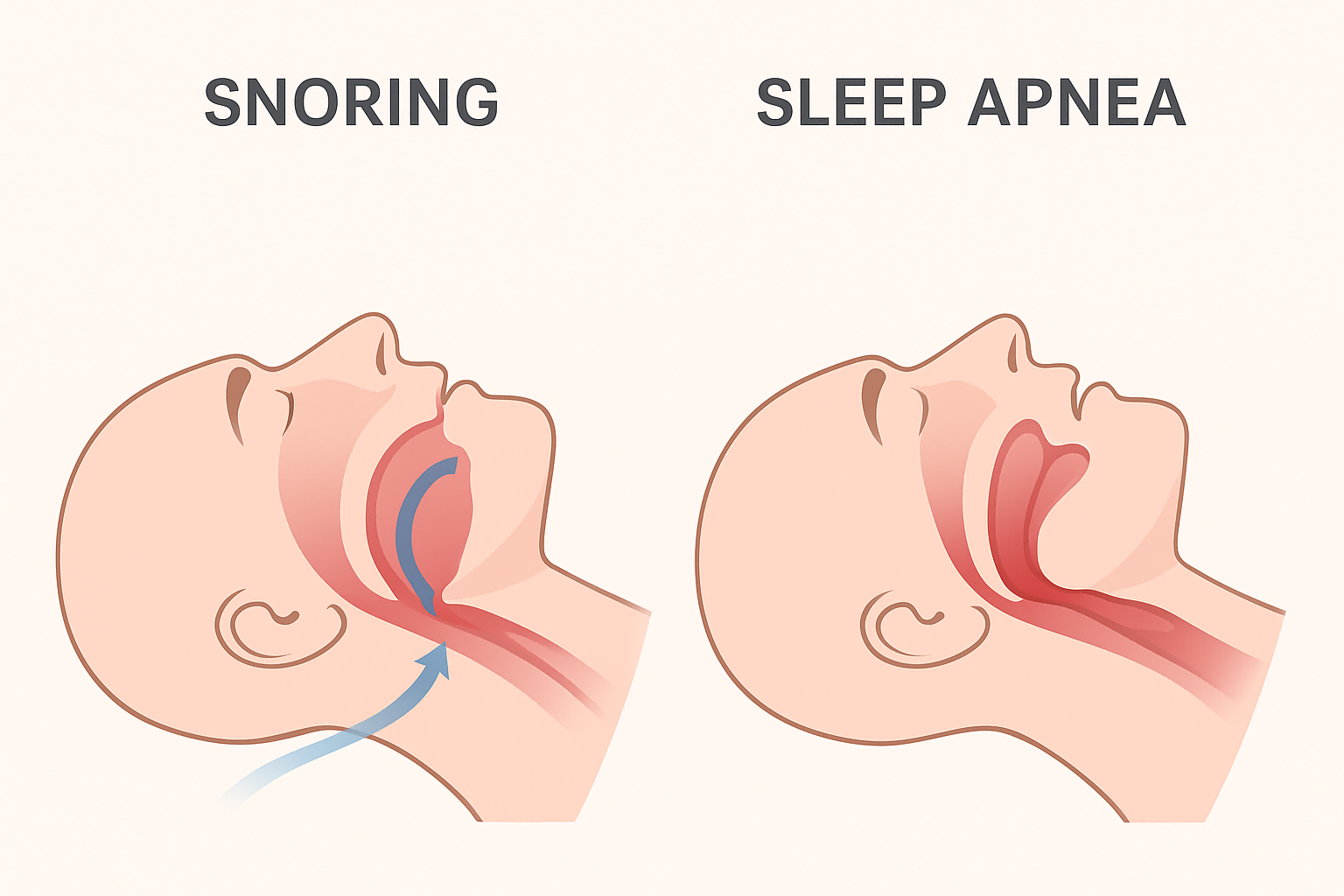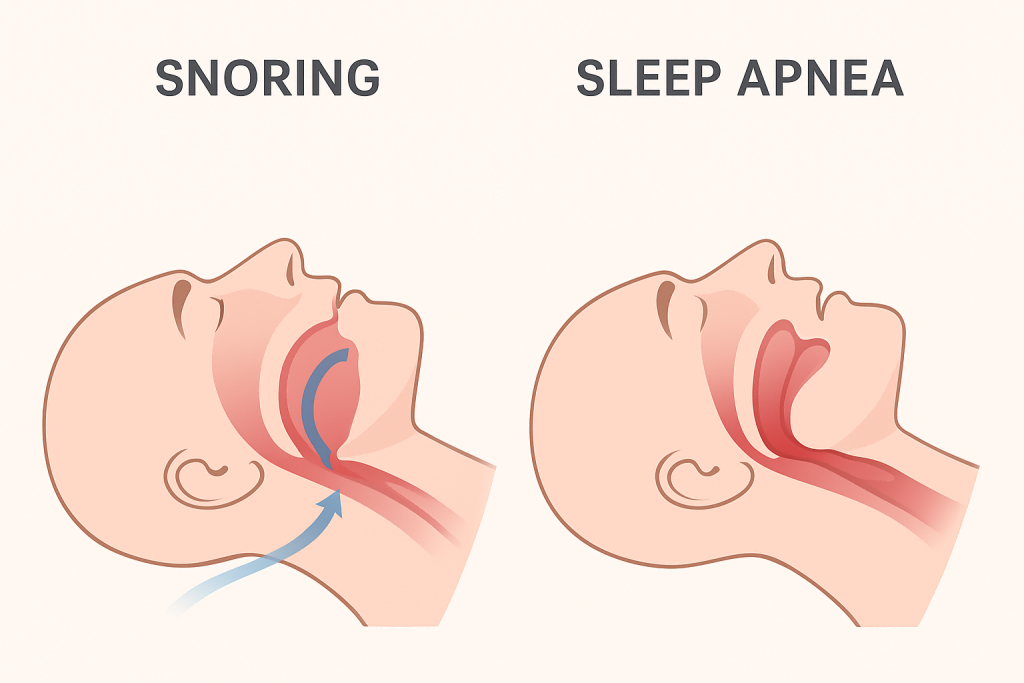Snoring and Sleep Apnea: Causes, Risks, and Treatments


Sleep is supposed to recharge your body and mind, but for millions worldwide, snoring and sleep apnea disrupt that natural process. While occasional snoring may seem harmless, it can sometimes signal a more serious condition—sleep apnea. Left untreated, sleep apnea increases the risk of high blood pressure, heart disease, stroke, and even memory issues.
In this article, we’ll break down everything you need to know about snoring and sleep apnea, including causes, risks, treatments, and prevention strategies to help you sleep better.
Understanding Snoring: Why It Happens
Snoring occurs when air flows through your throat during sleep, causing the tissues in your airway to vibrate. The sound may range from a soft whistle to a thunderous rumble, depending on the severity.
Common Causes of Snoring
- Nasal congestion (allergies, sinus infections, or deviated septum)
- Obesity, which narrows the airway
- Alcohol consumption, which relaxes throat muscles
- Sleeping on your back, making the tongue fall backward
- Aging, since muscle tone decreases with age
Risk Factors That Make Snoring Worse
Some people are more likely to snore due to:
- Family history of snoring or sleep apnea
- Smoking and frequent alcohol use
- Enlarged tonsils or adenoids
- Male gender (men are more prone to snoring and apnea)
What Is Sleep Apnea?
Sleep apnea is a serious sleep disorder where breathing repeatedly stops and starts during sleep. This can lead to oxygen deprivation, frequent awakenings, and severe daytime fatigue.
Types of Sleep Apnea
- Obstructive Sleep Apnea (OSA): Most common, caused by airway blockage.
- Central Sleep Apnea (CSA): Brain fails to send signals to breathing muscles.
- Mixed Sleep Apnea: A combination of both OSA and CSA.
Key Symptoms of Sleep Apnea
- Loud, chronic snoring
- Episodes of breathing pauses (often noticed by a partner)
- Gasping or choking during sleep
- Excessive daytime sleepiness
- Morning headaches
- Poor concentration and mood changes
The Connection Between Snoring and Sleep Apnea
Not everyone who snores has sleep apnea, but nearly all with sleep apnea snore.
How Snoring Can Signal Sleep Apnea
- Snoring that is loud and persistent
- Snoring followed by silence and then gasping
- Snoring accompanied by restless sleep
Health Risks Linked to Untreated Sleep Apnea
- High blood pressure
- Heart attack and stroke
- Type 2 diabetes
- Memory problems and dementia risk
- Reduced life expectancy
Diagnosis and Tests for Sleep Apnea
If sleep apnea is suspected, doctors recommend polysomnography (sleep study).
Sleep Studies and Home Testing
- In-lab Sleep Study: Monitors brain waves, oxygen levels, heart rate, and breathing.
- Home Sleep Apnea Test (HSAT): Portable device to measure breathing and oxygen.
Effective Treatments for Snoring and Sleep Apnea
Lifestyle Changes That Reduce Snoring
- Losing weight
- Avoiding alcohol before bed
- Stopping smoking
- Exercising regularly
Medical Devices
- CPAP (Continuous Positive Airway Pressure): Keeps airways open with steady airflow.
- Oral Appliances: Repositions jaw or tongue to prevent obstruction.
Surgical Options
- Uvulopalatopharyngoplasty (UPPP)
- Inspire therapy (nerve stimulation)
- Nasal surgery for structural blockages
Natural Remedies and Prevention Tips
Best Sleeping Positions
- Sleeping on your side instead of your back
- Using special anti-snoring pillows
Diet and Weight Management
- Maintaining a healthy BMI
- Avoiding heavy meals before bedtime
Breathing Exercises
- Practicing yoga or singing to strengthen throat muscles
When to See a Doctor
See a doctor if:
- Snoring is loud and disruptive
- You experience choking, gasping, or long pauses in breathing
- Daytime sleepiness interferes with daily life
FAQs on Snoring and Sleep Apnea
Q1: Can snoring alone be dangerous?
Not always, but it may be a sign of sleep apnea if it’s chronic and loud.
Q2: Is sleep apnea more common in men or women?
It’s more common in men, but risk increases in women after menopause.
Q3: Can children have sleep apnea?
Yes, often due to enlarged tonsils or adenoids.
Q4: Is CPAP the only treatment for sleep apnea?
No—oral appliances, lifestyle changes, and surgeries are alternatives.
Q5: Can weight loss cure sleep apnea?
In mild cases, yes. In severe cases, medical treatment may still be needed.
Q6: How many hours of untreated apnea episodes are dangerous?
Even short, repeated episodes are harmful and increase long-term risks.
Conclusion: Taking Control of Your Sleep Health
Snoring and sleep apnea may seem like nighttime nuisances, but they can be life-threatening if ignored. The good news? With proper diagnosis, lifestyle changes, and treatments like CPAP or oral appliances, you can reclaim restful sleep and protect your long-term health.
If you suspect you or a loved one has sleep apnea, don’t delay—consult a sleep specialist today.
👉 Learn more about sleep apnea at American Academy of Sleep Medicine.
















